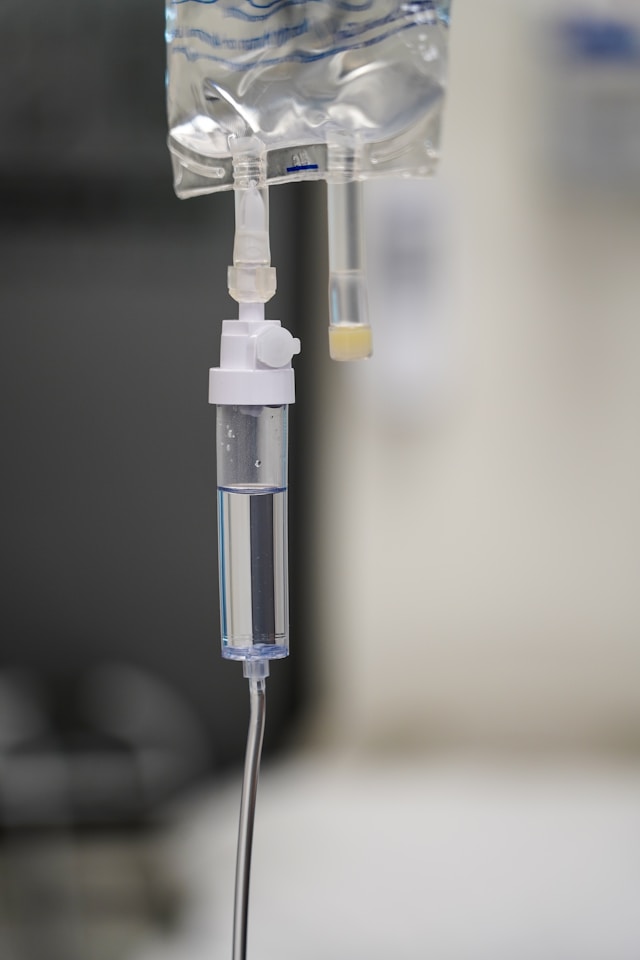
How Much Does Infusion Therapy Cost? (Insurance & Out-of-Pocket Guide)


Dr. Chen is a board-certified immunologist with over 15 years of experience treating autoimmune and immunodeficiency disorders. She specializes in IVIG therapy and has published extensively on immune system treatments.
Medical Disclaimer
Understanding the cost of infusion therapy is one of the most important—and often most confusing—aspects of starting treatment. Infusion medications and services can be expensive, but the actual amount you pay depends on many factors including your insurance coverage, where you receive treatment, and which medication you're prescribed. While costs vary widely, most patients with insurance pay far less than the full price, and financial assistance programs can help reduce out-of-pocket expenses even further. This guide breaks down what influences infusion therapy costs and how to navigate the financial aspects of your treatment.
Key Highlights
- Infusion therapy costs vary widely from $500 to $10,000+ per session depending on the medication, with biologic drugs typically being the most expensive component.
- Most insurance plans cover medically necessary infusion therapy under your medical benefit (not pharmacy), though you'll typically pay copays, coinsurance, or amounts toward your deductible.
- Patient assistance programs, copay cards, and financial counseling services can significantly reduce your out-of-pocket costs, making treatment affordable for most patients.
What Determines the Cost of Infusion Therapy
Several factors influence how much infusion therapy costs and what you'll ultimately pay:
The Medication Itself: Your specific drug is typically the largest cost component. Some medications cost a few hundred dollars per dose, while others can cost $5,000-$15,000 or more per infusion. Biologic medications and specialty drugs tend to be the most expensive because they're complex to manufacture and represent cutting-edge treatment options.
Dosage and Frequency: Your dose may be based on your body weight or condition severity, affecting cost. Someone needing a higher dose or more frequent infusions will have higher total costs than someone requiring lower doses or less frequent treatment.
Where You Receive Treatment: Hospital-based infusion centers typically charge more than freestanding infusion clinics. Home infusion services may have different cost structures. The facility fee (separate from the medication cost) varies significantly by location.
Your Insurance Plan: Your specific insurance coverage, deductible, copay structure, and whether providers are in-network dramatically affect your out-of-pocket costs. The same infusion could cost one patient $50 and another patient $2,000 based solely on their insurance plan details.
Additional Services: Costs may include pre-medications, IV supplies, nursing services, monitoring, and administrative fees. Some facilities bundle these into one price, while others itemize each component.
According to the American Hospital Association, infusion therapy pricing varies significantly across healthcare settings, making it important for patients to understand their specific situation.
Average Cost Ranges by Medication Type
While every situation is unique, here are general cost ranges for common infusion therapies (these are total costs before insurance):
Biologic Infusions for Autoimmune Conditions: $1,500-$8,000+ per infusion
- Remicade (infliximab): $1,500-$3,000 per infusion
- Entyvio (vedolizumab): $3,500-$5,000 per infusion
- Orencia (abatacept): $2,000-$4,000 per infusion
- Stelara (ustekinumab): $10,000-$15,000 for initial infusion dose
Multiple Sclerosis Infusions: $3,000-$25,000+ per infusion
- Ocrevus (ocrelizumab): $30,000-$35,000 for the complete twice-yearly dose
- Tysabri (natalizumab): $5,000-$7,000 per monthly infusion
- Lemtrada (alemtuzumab): $100,000+ for a complete treatment course
IVIG Therapy: $2,000-$10,000+ per infusion
- Cost varies significantly based on dose (which is weight-based) and IVIG product used
- Patients typically need monthly treatments
Iron Infusions: $400-$4,000 per treatment course
- Injectafer: $1,000-$2,500 for two-dose treatment
- Venofer: $500-$1,500 per treatment course
- Feraheme: $1,500-$3,000 for two-dose treatment
Migraine Prevention Infusions: $1,200-$1,800 per infusion
- Vyepti: $1,400-$1,600 per quarterly infusion
Bone Strengthening Infusions: $1,000-$2,500 per annual infusion
- Reclast: $1,200-$2,000 for yearly treatment
These figures represent what's billed to insurance, not necessarily what you pay. Your actual out-of-pocket costs depend on your insurance coverage.
How Insurance Covers Infusion Therapy
Understanding how insurance handles infusion therapy helps you anticipate your costs:
Medical Benefit vs. Pharmacy Benefit: Infusion therapy administered in a clinical setting is typically covered under your medical benefit (like doctor visits and procedures), not your pharmacy benefit. This distinction matters because your cost-sharing structure may be different. According to Medicare.gov, this is why you might pay different amounts for the same medication when given as an infusion versus as a self-injection at home.
Prior Authorization: Most insurance companies require prior authorization before approving infusion therapy. Your doctor's office submits documentation explaining why you need this specific treatment, and the insurance company reviews and approves (or sometimes denies) coverage. This process can take days to weeks, so start early.
In-Network vs. Out-of-Network: Receiving infusion therapy from an in-network provider typically costs significantly less than going out-of-network. Always verify that your infusion center is in your insurance network before starting treatment.
Cost-Sharing Structure: Your out-of-pocket costs typically include:
- Deductible: You may need to pay your full deductible amount before insurance begins covering costs
- Copay: A flat fee per infusion visit (e.g., $50-$250 per treatment)
- Coinsurance: A percentage of the total cost (e.g., you pay 20%, insurance pays 80%)
- Out-of-Pocket Maximum: Once you reach this annual limit, insurance covers 100% of costs for the remainder of the year
Medicare Coverage: Original Medicare Part B covers infusion therapy when medically necessary. You typically pay 20% of the Medicare-approved amount after meeting your Part B deductible. Medicare Advantage plans have their own coverage structures that may differ.
What You'll Actually Pay: Real-World Examples
To illustrate how insurance affects actual costs, here are some realistic scenarios:
Example 1: Patient with Good Commercial Insurance
- Medication cost: $4,000 per infusion (Remicade)
- Facility fee: $500
- Total billed: $4,500
- Patient has met deductible and has 20% coinsurance
- Patient pays: $900 per infusion (20% of $4,500)
- With manufacturer copay card: Patient pays $50-$100 per infusion
Example 2: Patient Early in the Year (Deductible Not Met)
- Medication cost: $5,000 per infusion (Ocrevus)
- Facility fee: $800
- Total billed: $5,800
- Patient has $2,500 remaining on deductible
- Patient pays: $2,500 for first infusion, then coinsurance for subsequent treatments
- After meeting deductible, patient might pay $1,160 per infusion (20% coinsurance)
Example 3: Medicare Patient
- Medication cost: $3,000 per infusion
- Facility fee: $400
- Medicare-approved amount: $2,800 (Medicare negotiated rate, often lower than billed amount)
- Patient pays: 20% of $2,800 = $560 per infusion after Part B deductible is met
Example 4: Patient with High-Deductible Health Plan
- Medication cost: $2,500 per infusion
- Patient has $5,000 deductible, none met yet
- Patient pays: Full $2,500 for first two infusions until deductible is met
- After deductible met: Potentially much lower copay or coinsurance
These examples show why knowing your specific insurance details is crucial for estimating your costs.
Financial Assistance Programs That Can Help
If infusion therapy costs seem overwhelming, numerous programs can help reduce your out-of-pocket expenses:
Manufacturer Copay Cards and Patient Assistance Programs: Most biologic and specialty drug manufacturers offer copay assistance cards that can reduce your costs to $0-$50 per infusion, even if your insurance requires significant cost-sharing. These programs are typically available for patients with commercial insurance. Some manufacturers also offer free or low-cost medication for uninsured or underinsured patients who meet income requirements.
Foundation Assistance: Independent charitable foundations provide grants to help with copays and out-of-pocket costs for patients with specific diagnoses. Organizations like the Patient Access Network Foundation, HealthWell Foundation, and disease-specific foundations (Crohn's & Colitis Foundation, National MS Society, etc.) offer financial assistance programs.
Hospital Financial Assistance: Many hospitals and infusion centers have financial counselors who can help you navigate insurance, apply for assistance programs, and potentially qualify for charity care if you meet income requirements.
Insurance Appeals: If your insurance denies coverage or requires you to try other treatments first (step therapy), your doctor can appeal the decision with supporting documentation about why you need this specific treatment. Many denials are overturned on appeal.
Alternative Infusion Locations: Switching from a hospital-based infusion center to a freestanding clinic may reduce your costs since facility fees are often lower. Home infusion services can sometimes be more cost-effective as well.
The Patient Advocate Foundation provides resources and support for navigating financial challenges related to medical treatment.
Questions to Ask Before Starting Infusion Therapy
To understand your financial responsibility, ask these questions:
Questions for Your Insurance Company:
- Is this medication covered under my plan?
- Do I need prior authorization, and how do I get it?
- What is my deductible, and how much have I met this year?
- What is my copay or coinsurance for infusion therapy?
- What is my out-of-pocket maximum for the year?
- Is [specific infusion center] in my network?
- Are there any preferred providers for infusion therapy?
Questions for the Infusion Center:
- What is the total cost of my treatment (medication + facility fees)?
- Do you accept my insurance?
- Can you provide a cost estimate based on my insurance?
- Do you have a financial counselor who can help me?
- What payment plans are available if I can't pay the full amount?
- Can you help me apply for patient assistance programs?
Questions for Your Doctor:
- Are there alternative medications that might be more affordable?
- Is my diagnosis one that qualifies for foundation assistance?
- Can you help me appeal if insurance denies coverage?
- Do you know of any patient assistance programs for this medication?
Tips for Managing Infusion Therapy Costs
Review Your Insurance Benefits Carefully: Understanding your plan details helps you anticipate costs and avoid surprises. Know your deductible, copay structure, and out-of-pocket maximum.
Apply for Copay Assistance Early: Don't wait until you're struggling with costs. Apply for manufacturer copay cards and foundation assistance before or immediately after starting treatment.
Keep Detailed Records: Track what you're billed, what insurance pays, and what you pay out-of-pocket. This helps you know when you've met your deductible or out-of-pocket maximum.
Ask About Cash/Self-Pay Prices: In some cases, if you're paying out-of-pocket, facilities may offer discounted self-pay rates that are lower than insurance-negotiated rates.
Consider Timing: If you're starting treatment late in the year and have already met your deductible, you might pay very little for remaining infusions that year. Conversely, costs may be higher when your deductible resets in January.
Explore All Treatment Settings: Compare costs between hospital-based infusion, freestanding clinics, and home infusion to find the most affordable option that meets your medical needs.
Communicate Financial Concerns: Healthcare providers and infusion centers want to help you access treatment. Don't be embarrassed to discuss financial concerns—they have resources and experience helping patients find solutions.
Frequently Asked Questions
How much does infusion therapy cost without insurance?
Without insurance, infusion therapy costs can range from $500 to over $10,000 per session depending on the medication. Biologic drugs for autoimmune conditions typically cost $1,500-$8,000 per infusion, while specialty medications like MS treatments can cost significantly more. However, manufacturer patient assistance programs often provide free or deeply discounted medication to uninsured patients who meet income requirements, making treatment affordable even without insurance coverage.
Does Medicare cover infusion therapy?
Yes, Medicare Part B covers medically necessary infusion therapy administered in outpatient settings. After you meet your Part B deductible, you typically pay 20% of the Medicare-approved amount for both the medication and the administration service. Medicare Advantage plans may have different cost-sharing structures. Some beneficiaries qualify for supplemental insurance (Medigap) or financial assistance programs that help cover the 20% coinsurance.
What is a copay card for infusion therapy?
A copay card (also called copay assistance or patient savings card) is a program offered by drug manufacturers that reduces your out-of-pocket costs for specific medications. These cards can cover some or all of your copay, coinsurance, or deductible, often reducing your cost to $0-$50 per infusion regardless of what your insurance requires. Copay cards are typically available for patients with commercial insurance but not for government insurance like Medicare or Medicaid.
Can I negotiate infusion therapy costs?
While you typically can't negotiate the medication cost (set by the manufacturer) or insurance-negotiated rates, you may be able to negotiate facility fees, payment plans, or reduced self-pay rates if you're paying out-of-pocket. Many hospitals and infusion centers offer financial assistance programs or discounts for patients experiencing financial hardship. It never hurts to ask about available options or to work with a financial counselor.
What happens if I can't afford my infusion therapy?
If you're struggling to afford infusion therapy, don't stop treatment without talking to your healthcare team. Options include applying for manufacturer patient assistance programs, seeking grants from charitable foundations, working with your infusion center's financial counselor, setting up payment plans, switching to a lower-cost treatment setting, appealing insurance denials, or applying for hospital charity care. Most patients can find a way to access needed treatment with assistance from these programs.
Don't Let Cost Prevent You From Getting Treatment
While infusion therapy can be expensive, financial assistance programs and insurance coverage make it accessible for most patients who need it. The key is understanding your specific situation, exploring all available assistance programs, and communicating openly with your healthcare team about financial concerns.
Many patients are surprised to discover that with copay cards and assistance programs, their actual out-of-pocket costs are far lower than they initially feared.
Ready to explore infusion centers and understand your treatment options? Find infusion centers near you and speak with financial counselors who can help you navigate costs and coverage.
Medical Disclaimer: This content is for educational purposes only and is not a substitute for professional medical advice, diagnosis, or treatment. Always consult your healthcare provider with questions about your medical condition or treatment options.
Article Statistics


Table of Contents
Article Statistics










